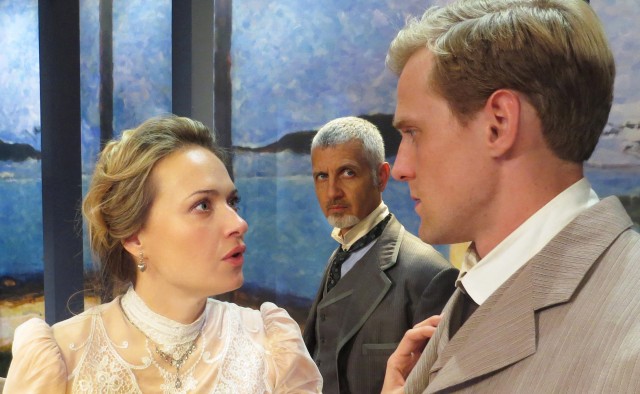“Creditors” is a 95-minute performance of concentrated dramatic action. Plot events unfold so quickly that audience members can hardly keep track of which characters are manipulating who before the play’s shocking ending.
The Odyssey Theatre Ensemble and The New American Theatre present David Greig’s modernized translation of August Strindberg’s play “Creditors,” directed by David Trainer, which re-opens Strindberg’s vision for contemporary audiences. The show runs from Oct. 11 through Dec. 15 at the Odyssey Theatre Ensemble in Los Angeles.
“Creditors” takes place in a seaside hotel in Sweden in 1888. The play begins as Adolf, a depressed artist, gets advice from his new friend Gustav on how to deal with his wife Tekla, whom he suspects of infidelity.
Gustav takes advantage of Adolf’s susceptible state and convinces him that Tekla has absorbed his strengths while emotionally knocking him down for the entirety of their relationship.
Burt Grinstead, who plays Adolf, successfully embodies the behavior of a depressed man trying to convince himself he’s happy. He forces smiles as he speaks of his wife’s demasculinizing behavior through Adolf’s sugar-coated dialogue minimizing all of his wife’s flaws, convinced she behaves only for his benefit.
Grinstead manifests emotions of tension, insecurity and anger, juxtaposed with the praises he bestows upon his wife for her ambitious nature. This paves the way for Gustav to plant venomous doubts about Tekla’s motivations and her conspicuous nature into Adolf’s malleable mind, and leads to many unexpected plot twists and unanswered questions as the play begins to pick up pace.
Each of the intricate, psychological plot twists in “Creditors” is skillfully revealed by the hands of the director Trainer. His staging of the production masterfully creates moments of tension by using his actors as pieces to create striking visualizations on a minimalist set, consisting of a table, chairs and a chaise lounge. His blocking exposes the different characters’ dynamic relationships, none of whom ever appear on the stage at the same time until the closing moment of the play.
By the end of the first scene, Adolf is transformed from a sniveling husband into a raging, jealous one. It’s clear something is amiss through the contrast between his metamorphosis and Gustav’s cool composure, but the audience is left speculating about exactly what’s wrong.
Playing Gustav, Jack Stehlin is particularly successful in his portrayal of the vindictive character. Each of his moves are well calculated, his speech reserved. He fully develops Gustav’s multifaceted character into a chilling antagonist through the way he manipulates each of the other characters like marionettes, preying upon each of their weaknesses.
While “Creditors” is advertised as a “take on the battle of the sexes,” from a feminist viewpoint, there is no battle. It is simply the story of a woman struggling to gain power through the only tool she has left, sexual manipulation, while the men around her try to squash her back into her role as an obedient wife.
Greig’s colloquial translation of Strindberg’s script makes its misogynistic nature stand out even more in the play, seeming almost anachronistic with modernized speech patterns.
Heather Anne Prete’s interpretation of Tekla, although powerful with a strong command of the language, feels rather two-dimensional. It is a distinct archetype of the manipulative, yet ultimately flawed female character found in many works of the time that ultimately leave Prete’s performance feeling somewhat unsatisfying.
The costumes, reflecting the 19th century, also seem a little odd with the increased colloquial nature of the modern dialogue. Nonetheless, they serve the political and societal elements of the play well, reflecting so many of the thematic elements that seem out of place within the new time period.
Ultimately, “Creditors” is an enjoyable thrill at the theater, filled with lust, temptation, revenge and all the fantastic dramatic tropes that make up an enjoyable performance.

